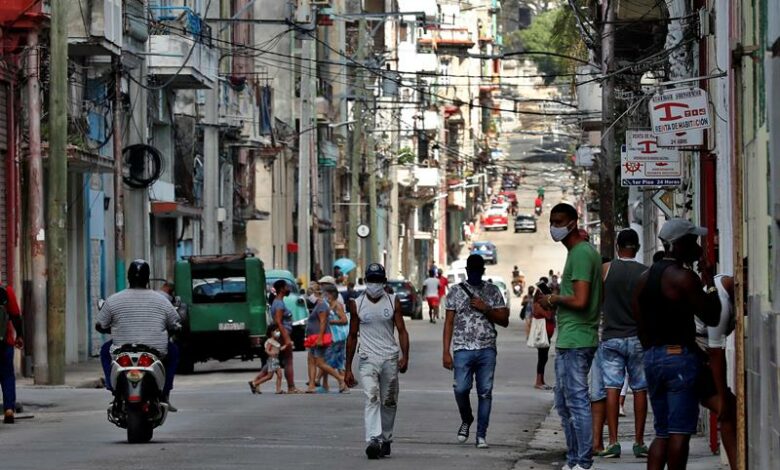LaPrensaLatina By Atahualpa Amerise
Havana, Jul 7 (EFE).- While a large portion of the world is recovering from the Covid-19 pandemic, Cuba is suffering its worst outbreak with new infection records being set almost daily and the healthcare system on the verge of collapse in the province of Matanzas, where patients are piling up in the halls of hospitals and there is a scarcity of medications to treat them.
The Covid-19 infection rate in Cuba over the past two weeks has been 381 cases for every 100,000 residents but in Matanzas province, east of Havana, the figure stands at 1,316, higher than in Madrid, Spain, at the worst point in the crisis.
“We’ve put beds in the halls,” a doctor at the hospital in the city of Cardenas told provincial TV Yumuri, adding that there is a lack of bottled oxygen and blood gases to treat the avalanche of patients with respiratory problems.
Being received from Cardenas, one of the Cuban cities hardest hit by the coronavirus, are images of patients piling up in hospitals, some of them lying on benches in waiting rooms, on the floor of the corridors or out in the street in front of the entrance, where overwhelmed medical personnel are attending to them as best they can.
“This is what’s really scary,” a young Matanzas woman told EFE, showing the fear that is spreading in this province where people on Wednesday are sharing on the social networks the message “S.O.S. Help Matanzas! We need medications. We need medical attention. Our doctors need help. SalvenaMatanzas.”
In the face of this alarming situation, the government has implemented drastic measures such as sending to Cardenas a group of 36 military doctors and nurses and issuing medical licenses early to 373 local students in their last year of medical school.
In addition, 200 healthcare workers with the international Henry Reeve Brigade have been sent to Matanzas, although that group heretofore had been tapped exclusively for missions abroad.
The medical personnel who have been massively mobilized in the affected zones will work under difficult conditions, not only due to the huge influx of patients but also because of another problem Cuba has been experiencing for months: the lack of medications.
Finding a simple painkiller or antibiotic is an ordeal in this Caribbean country, where pharmacies and hospitals are almost out of a wide variety of drugs amid a significant health crisis that prevailed even before the pandemic hit, the US embargo and the questionable efficiency of the ongoing measures.
It’s paradoxical that Cuba is suffering through its worst Covid-19 healthcare crisis just at the peak of its vaccination campaign.
More than 6.7 million of the country’s 11.2 million residents have received at least one dose of the three-dose Soberana 02 or Abdala vaccines, the two vaccines that are being manufactured and tested locally, have shown high efficiency but have not yet received definitive official approval.
Vaccination “is the solution in the long term that will prevent the arrival of a crisis moment like the current one, but it takes time, and when it occurs amid a wave like the one Cuba is facing now it’s necessary to employ non-pharmacological measures,” Cuban molecular biologist and researcher with the University of the State of Sao Paulo (UNESP), Amilcar Perez Riverol, told EFE.
“The examples of countries like Chile or Brazil show that vaccination in and of itself is not enough to immediately halt the outbreaks,” he warned.
Regarding the causes of the virulent summer outbreak on the communist island, Perez Riverol pointed, among other things, to “pandemic fatigue” with the resulting decline in the perception of risk, the street crowds standing in line to buy scarce food and the circulation of new more transmissible coronavirus strains, like the Delta variant.
Many people have commented on the invasion of the Delta strain and its rapid spread in Matanzas with the massive presence of Russian tourists at the province’s main vacation spot, Varadero, where they could have infected workers who are now spreading the virus into the nearby municipality of Cardenas and other towns and cities in the area.
“It’s very difficult to prove. It would require a serious epidemiological analysis. What’s certain is that Russia is registering record numbers of daily cases and deaths due to the circulation of the Delta variant,” said Perez Riverol regarding this hypothesis.
He said that “the current trend indicates that in the immediate future the epidemiological situation will be complicated, not only in terms of infections but also in the pressure on the hospital system” in Cuba.
For the second consecutive day, the country set a new record of 3,664 newly detected cases with 18 people dying from Covid.
The UNESP researcher said that the short- and medium-term evolution of the situation will depend on the country’s ability to correct the assorted factors that have led to this set of circumstances and the speed with which the immunization program progresses.

